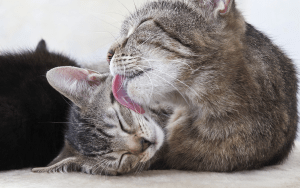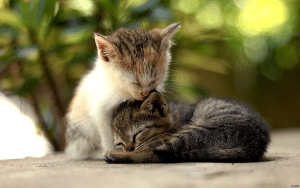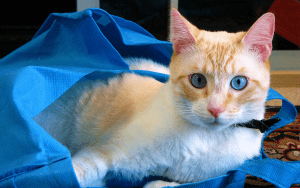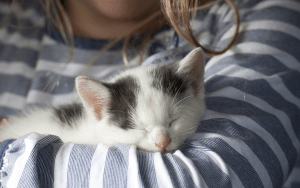For ongoing good health of your pet, regular vet visits are necessary.
Vaccinations – why is it important to vaccinate?
Making sure your animals are vaccinated against common diseases is an important step of maintaining your pet’s health and vitality, and provides the best protection from disease, some of which are fatal.
Vaccines have been useful in reducing several infectious diseases from spreading further, helping to eradicate some of these diseases. If the number of pets protected by regular vaccines is ignored, then your pet is at risk from contracting and further spreading these serious infectious diseases.
Vaccinations are a responsible pet owner’s best assurance to ensuring your companion animal has the best possible protection from preventable disease, and are important in controlling possible outbreaks.
Partaking in vaccination programs is also extremely cost effective when compared with the cost of corrective treatment, and reducing distress and suffering for your pet while also reducing stress of potential loss.
How do vaccines work?
Vaccines help a body’s immune system prepare in advance to fight infectious diseases.
Essentially, vaccines give the body a preview of a bacterium or a virus, allowing it to learn how to defend itself against that potential invader in advance. When your pet receives a vaccine, its immune system produces special substances called antibodies that work against the virus or bacteria that cause the disease. Later, if your pet is exposed to these viruses or bacteria, the formed antibodies will help destroy them, thus prevent your pet from becoming ill.
It is important that your pet is healthy at the time of vaccination so that the immune system can develop its protective response properly.
How often do we need to vaccinate?
When puppies and kittens are born they are usually protected from infections by their mother’s milk. However, this protection only lasts for some weeks, so our little pets need regular vaccinations from an early age.
Puppies and kittens need a series of 2 or 3 vaccines given 3-4 weeks apart. After this they need a vaccine booster one year later. Once they have had these vaccines, the frequency of vaccinations varies depending on the lifestyle of the pet, the disease and vaccine type being considered as well as any kennel/boarding plans. Some vaccinations are 3-yearly while others are yearly.
Because of these varying factors, YourPetVet recommends that you bring your pet in for routine annual examinations where a vaccination plan for your pet can be decided during a discussion between you and your vet.
Do vaccinations guarantee that your pet will not get sick?
Unfortunately, no vaccine can guarantee complete protection from a disease.
However, vaccines drastically reduce the chance of developing the disease. If your pet does become ill with a disease he or she has been vaccinated for, the vaccine is likely to reduce the symptoms and make recovery quicker.
Are there any side effects from vaccines?
Vaccinations may sometimes cause side effects – but adverse reactions are rare events.
Side effects are usually mild reactions such as fever, soreness at the injection site or loss of appetite.
These responses usually resolve within 24 hours.
In a few rare cases a pet may react with an allergic reaction to a vaccine.
YourPetVet will discuss with you which symptoms to look for in these cases.
Other adverse reactions can also occur, but are extremely rare.
The benefits of vaccines far outweigh the risks of any potential side effects.
Together, we can manage your pet’s health maintenance …
- Avoid and minimise the risk of / affects from the onset of disease

- Annual health checks
- Dental care and oral hygiene
- Diagnostic procedures with X-rays and ultrasound
- Emergency 24-hour services available
- Health maintenance using dietary supplements
- Managing seasonal / regional changes and effects of parasites
- Neutering and spaying
- Nutritional advice by regulating a balanced dietary intake
- Operating Theatre
- Pet accessories
- Premium pet food

- Recommendations / treatments
- Supplies of our recommended nutritious foods
- Vaccinations and booster shots
- Veterinary consultations
- Weight management / weight loss dietary advice and monitoring programs
- Worming products
- all are important considerations in maintaining the healthy, vitality, happiness and longevity of your pet.
We provide up-to-date vaccinations and scheduling for your pet including
For Cats…
Your cat will require vaccinations to aid in the prevention of the following conditions.
Kittens need an individual vaccination program which is based on age. Typically, they will require vaccines at 8 and 12 weeks of age to ensure maximum protection against life threatening illnesses.
- Cat Flu (Herpes Virus and Calicivirus)
- Chlamydophilia
- Feline Aids (Feline Immunodeficiency Virus – FIV)
- Feline Leukaemia Virus (FeLV)
- Feline Parvo Virus
- Feline panleukopenia virus (Parvovirus)
- Rhinotracheitis
For dogs…
A kennel cough dog vaccination is required on a yearly basis. This is particularly important if your dog socialises with other dogs, or spends time in pet boarding facilities. Otherwise, the vaccine frequency varies depending on the type of vaccine used.
Some dog vaccinations require annual boosters, others can be extended to 3 years.
YourPetVet can help with choosing a dog vaccination programme to suit your pet’s needs.
Remember – checking your pet’s vaccination status when going on holiday as boarding catteries and kennels require their visitors to be vaccinated to prevent the spread of infectious diseases.
- Canine Distemper

- Canine Parvovirus
- Canine Adenovirus/Infectious Canine Hepatitis
- Leptospirosis
- Hepatitis
- Parainfluenza
- Kennel Cough (Canine Infectious Tracheobronchitis)
We also offer microchipping and registration at our clinic in Christchurch.
Microchipping is another method of identifying pets other than collars and tags which can be lost or removed. A microchip is permanent and providing it meets the required standards and has been inserted correctly it will function for the life of your pet.
Dog and cat microchipping was introduced for two main reasons. It enables a pet to be linked to its owner, so if it is stolen or lost, the pet owner can be reunited. It can also identify a dog which has been aggressive and classified as dangerous or menacing.
When any pet is found injured or lost and taken to vet or a welfare agency such as the SPCA, it is scanned, and if microchipped it can speedily be restored to its owner.
What is a Microchip?
A microchip is a small device about the size of a grain of rice, which is implanted under the skin of the neck.
The microchip has a unique number that can be scanned by a reader, similar to a barcode reader. This number is recorded in our database.
You will need to register it at your local Council on the National Dog Database (NDD) and it can be registered on the New Zealand Companion Animal Register (NZCAR).
The Procedure
Placing a microchip is a common procedure and is safe for your animal.
We strongly recommend that your animal is microchipped by YourPetVet to ensure the micro-chip is located and implanted properly and to minimise the risk of infections or microchip migration.
Dog Microchipping: Legal Requirements
Since 1 July 2006, all dogs registered in New Zealand for the first time (except farm dogs used for stock control) must be micro-chipped and registered with your local council. This applies mainly to puppies when they are first registered at three months old.
Dog microchipping is a MUST in the following circumstances:
- Dogs registered for the first time in NZ after 3 months old
- Dogs that have been classed as menacing or dangerous on or after 1 Dec 2003
- Dogs that are unregistered and have been impounded
- Dogs currently registered but have been impounded for a second time.
New Zealand Companion Animal Register (go to the NZCAR website here…)
 As microchipping has become more common place on the register which is designed specifically to make the recovery of lost pets easier (compared to the NDD who is primarily interested in dog control) by ensuring that anyone can quickly check to see that their microchip number is on the database.
As microchipping has become more common place on the register which is designed specifically to make the recovery of lost pets easier (compared to the NDD who is primarily interested in dog control) by ensuring that anyone can quickly check to see that their microchip number is on the database.
This service is available for a small fee and is an additional measure you can use to track your pet should they go missing.
Personal details can be updated by the owner at any time for no additional cost.
Microchipping Cats
Cats are more commonly lost and harder to find than their canine counterparts. They are also more likely to be hit on the road and presented to SPCA, Council and of course the nearest veterinary clinic for treatment.
Microchipping cats can help in the event of an accident. If an owner can be contacted immediately then treatment for the patient can be quickly started without any undue delay.
 Cats that have been FIV (Feline AIDs) vaccinated should also be microchipped. This is because, in the event they are picked up as strays and FIV tested, they will test as positive. The FIV test is unable to distinguish between an infected animal or an animal that has been vaccinated. To prevent your vaccinated cat from being euthanased as an FIV infected stray – the presence of a microchip will prevent this from happening as the owners and the cat’s vaccination history will easily be looked up once the microchip has been scanned, via the NZCAR database.
Cats that have been FIV (Feline AIDs) vaccinated should also be microchipped. This is because, in the event they are picked up as strays and FIV tested, they will test as positive. The FIV test is unable to distinguish between an infected animal or an animal that has been vaccinated. To prevent your vaccinated cat from being euthanased as an FIV infected stray – the presence of a microchip will prevent this from happening as the owners and the cat’s vaccination history will easily be looked up once the microchip has been scanned, via the NZCAR database.
The cost of microchipping is small compared to the stress of being unable to find your lost cat or dog, and the fact that they are in danger being displaced, cold and hungry.
Contact our friendly team today to find out more.





